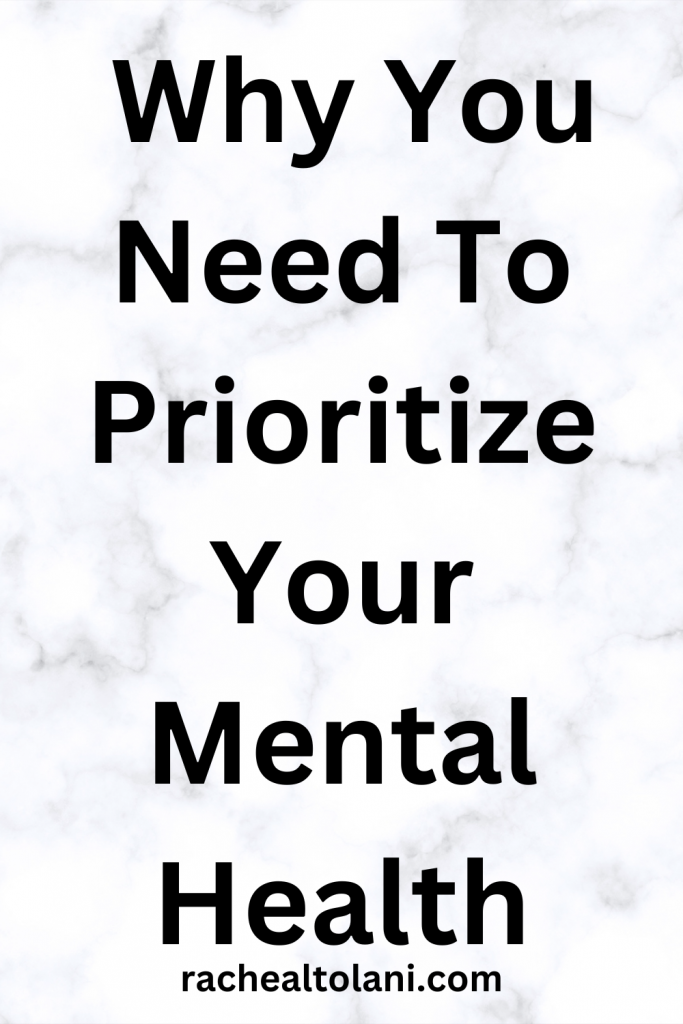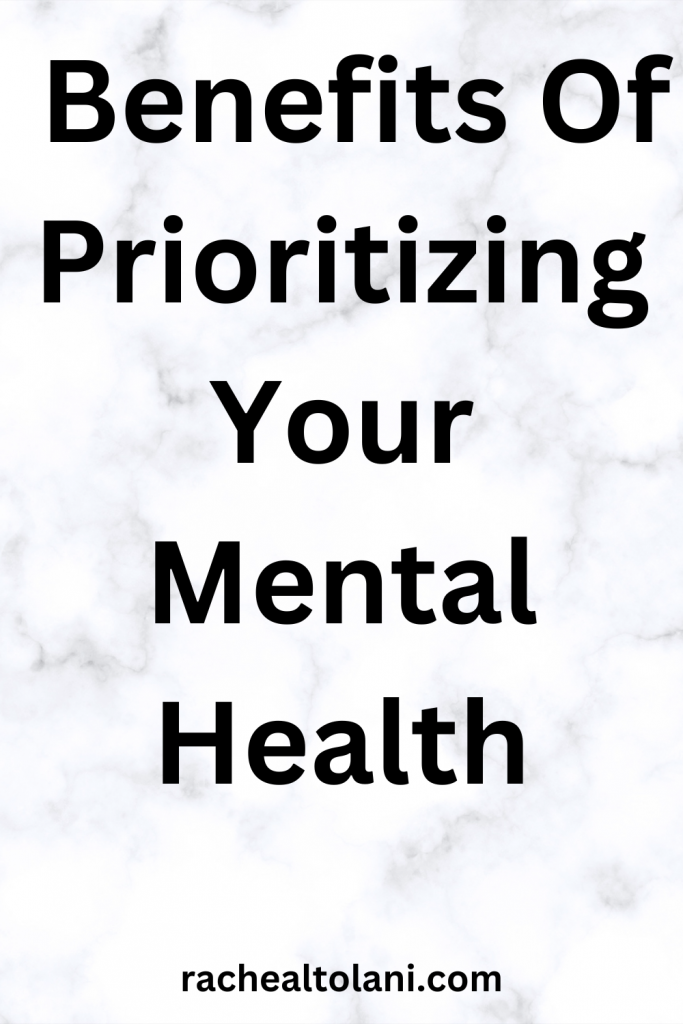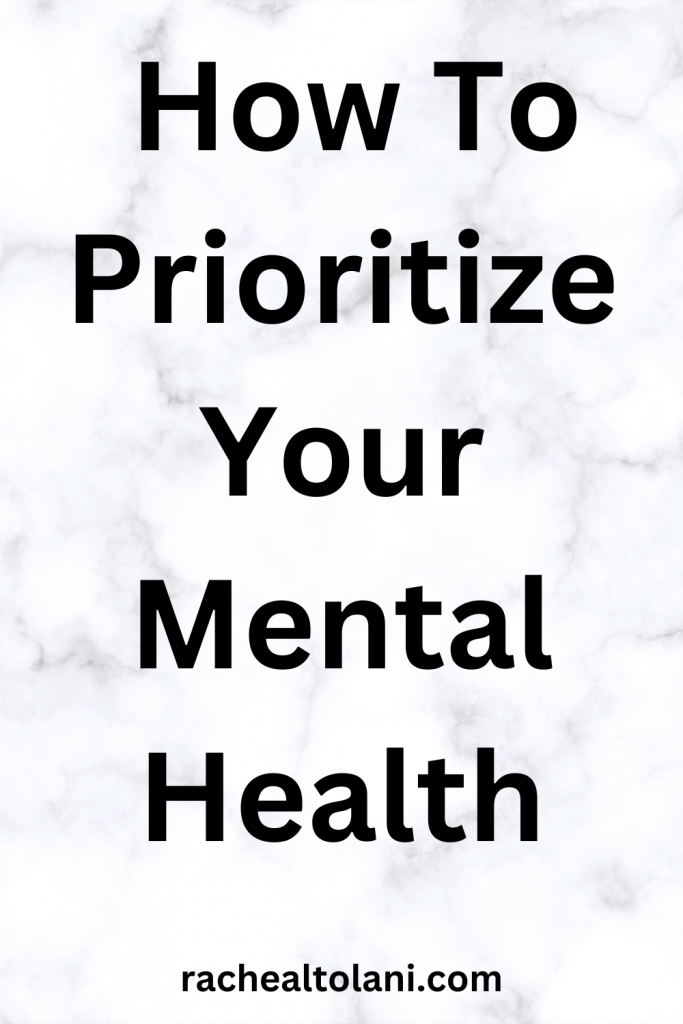Prioritizing your mental health is essential for overall well-being and quality of life. When you don’t value it, you can easily do many things that can affect your health. Therefore, how to prioritize your mental health and living a fulfilling life is paramount.

Here are practical steps to help you prioritize and maintain your mental health:
1. Set Boundaries
- Learn to Say No: Protect your time and energy by saying no to commitments that are overwhelming or not aligned with your well-being.
- Limit Social Media: Set limits on social media use, as it can contribute to stress, anxiety, and comparison.
2. Practice Self-Care
- Regular Exercise: Physical activity releases endorphins, improving mood and reducing stress.
- Healthy Eating: A balanced diet with nutrients like omega-3 fatty acids, vitamins, and minerals supports brain health.
- Adequate Sleep: Prioritize 7-9 hours of sleep each night to help your mind recharge and function optimally.
3. Manage Stress
- Mindfulness and Meditation: Practice mindfulness or meditation to stay present and manage anxiety. Apps like Headspace or Calm can be helpful.
- Deep Breathing Exercises: Use deep breathing techniques to reduce stress and promote relaxation.
4. Seek Professional Help
- Therapy or Counseling: Regular sessions with a therapist can provide guidance and support, helping you navigate challenges.
- Medication: If recommended by a healthcare professional, medication can be an effective part of managing mental health conditions.
5. Foster Healthy Relationships
- Surround Yourself with Positive People: Build a support system of friends and family who uplift and encourage you.
- Communicate Openly: Share your feelings with those you trust and tell them how they can support you.
6. Engage in Activities You Enjoy
- Hobbies and Interests: Spend time on activities that bring you joy and relaxation, whether it’s reading, gardening, or painting.
- Creativity: Engage in creative outlets like writing, drawing, or music to express your emotions and reduce stress.
7. Practice Gratitude
- Daily Gratitude Journal: Write down three things you’re grateful for each day to focus on the positive aspects of your life.
- Express Gratitude to Others: Let people know you appreciate them; it strengthens relationships and enhances your mood.
8. Limit Negative Influences
- Avoid Toxic Relationships: Distance yourself from people who drain your energy or contribute to negative thinking.
- Filter Negative Media: Be mindful of the media you consume; limit exposure to news or content that triggers stress or anxiety.
9. Prioritize Mental Health Days
- Take Breaks: Allow yourself time to rest and recharge when you feel overwhelmed. Mental health days are as important as physical health days.
- Unplug: Occasionally disconnect from technology to reduce mental clutter and focus on real-world interactions.
10. Cultivate Positive Thinking
- Affirmations: Use positive affirmations to challenge negative thoughts and build self-esteem.
- Reframe Negative Thoughts: Practice cognitive restructuring to identify and challenge unhelpful thoughts, replacing them with more balanced perspectives.
11. Develop a Routine
- Consistent Schedule: Create a daily routine that includes time for self-care, work, relaxation, and socializing. Consistency can provide stability and reduce stress.
- Prioritize Tasks: Break tasks into manageable steps and prioritize them to avoid feeling overwhelmed.
12. Engage in Community or Spiritual Activities
- Join a Community Group: Participate in community or group activities that align with your interests, such as volunteering, clubs, or religious groups, to foster a sense of belonging.
- Spiritual Practice: If applicable, engage in spiritual practices like prayer, meditation, or attending services to find comfort and purpose.
13. Practice Compassion and Forgiveness
- Be Kind to Yourself: Treat yourself with the same compassion you would offer a friend. Acknowledge that it’s okay to have bad days.
- Let Go of Guilt: Forgive yourself for past mistakes and focus on what you can do moving forward.

Conclusion
Prioritizing your mental health requires intentional actions and consistent effort. By incorporating these practices into your daily life, you can create a strong foundation for mental well-being, helping you navigate challenges with resilience and maintain a balanced, fulfilling life.

Also read:


I was in a really bad place emotionally because I had the suspicion my partner was cheating but I couldn’t confirm it. i reached out to a close friend and she introduced me to (infotheprohackers@gmail.com,) He explained how would grant me access to my partner phone without him being aware of course i was skeptical at first but i had to erase the doubts so i went through with the process and he delivered giving me access to his old texts and incoming texts on whatsapp, deleted messages facebook, all location, He also got me into his Instagram account and i was able to confirm my suspicious and leave that toxic relationship. I made the right call doing this because of the relief I felt after, you may also need this service if you find yourself with an untrustworthy partner.
I want to access my husband’s phone to the reason why he not give us attention anymore but I didn’t have physical access to touch his phone. I bought a spy app only to realize I have to install the app on his phone. I thought there was no way I could access his phone since I didn’t have physical access to touch his phone but luckily, a friend mentioned this great, honest and ethical hacker to me name kelvin,This hacker helped me have access despite not having physical access to touch his phone, i can access his phone i see who chat with online without his consent. If you need help on any hacking related issues you can contact them via email: kelvinethicalhacker@gmail.com, He’s always available online, text Signal Telegram +1(341)465-4599.